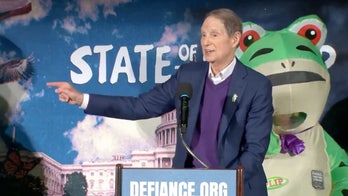Pence receives coronavirus vaccine, praises Operation Warp Speed: 'Truly a medical miracle'
Vice President Mike Pence makes remarks as he and second lady Karen Pence receive the coronavirus vaccine.
As the debate rages on about who should be next in line to receive the coronavirus vaccine, some experts say that essential workers should be prioritized over the elderly.
The U.S. began inoculating Americans with the Pfizer vaccine this week, and the Food and Drug Administration is working to authorize the Moderna coronavirus vaccine. But with limited supply, no vaccine is expected to be widely available until at least spring 2021.
Health care workers and long-term residents of nursing homes are first in line to receive the jab, but experts have yet to sort out who should be next. The Centers for Disease Control will soon issue a recommendation, after an independent panel of medical experts that advises the CDC votes on who to put forth for "Phase 1b."
In a committee meeting last month, all voting members voted to put essential workers ahead of those 65 and older and those with medical conditions that put them in a high-risk category.
The committee typically relies on science to inform decisions, but this time, social justice concerns have come up as well.
Harald Schmidt, an expert in ethics and health policy at the University of Pennsylvania, told the New York Times essential workers should be prioritized over older adults because "Older populations are whiter."
"Society is structured in a way that enables them to live longer. Instead of giving additional health benefits to those who already had more of them, we can start to level the playing field a bit."
The assertion led to pushback on social media.
"This is ghastly," Noah Rothman, editor at Commentary, wrote on Twitter. "This is the kind of dispassionate empiricism we've come to expect. Trust the science."
"I warned you people about social justice," he added.
"Also, he’s wrong—Asians and Hispanics have greatest life expectancy in US," wrote Christina Hoff Sommers. According to data compiled by worldlifeexpectancy.com from the CDC and NIH, Asian Americans have a life expectancy of 86.67 and Hispanic Americans, 82.89. White Americans have a life expectancy of 79.12.
"This is sick," radio host Jason Rantz wrote of Schmidt’s quote.
Schmidt denied espousing a "race-only approach" and pointed to his call for the CDC committee to integrate its own social vulnerability index. The index accounts for 15 factors, such as poverty, lack of vehicle access, and crowded housing.
PENCE GETS COVID VACCINE TO SHOW IT'S 'SAFE AND EFFECTIVE'
"The fundamental point is this: Among the population 65 and older, many can live socially distanced safely and with relatively less inconvenience until they receive a vaccine," Schmidt told Fox News. "But far more among the essential workers don’t have that option, especially frontline workers. For them, getting a vaccine sooner can literally be of existential importance."
Committee members are taking to heart ethical considerations, however they may interpret them.
"To me the issue of ethics is very significant, very important for this country," Dr. Peter Szliyagyi, a committee member and a pediatrics professor at the University of California, Los Angeles, said at the time. "And [ethics] clearly favors the essential worker group because of the high proportion of minority, low-income and low-education workers among essential workers."
But such assertions run counter to the highest authorities of medicine.
Dr. Robert Redfield, the CDC director and the nation’s top public health official, reminded the committee in a statement earlier this month that he anticipated "future recommendations that, based on vaccine availability, demonstrate that we as a nation also prioritize the elderly."
WHO SHOULD GET COVID-19 VACCINES NEXT?
After the committee votes, Redfield will decide whether or not to accept its recommendation as the official guidance of the CDC. Ultimately, it will be up to state and local health officials to follow the CDC’s guidance.
"If your goal is to maximize the preservation of human life, then you would bias the vaccine toward older Americans," Dr. Scott Gottlieb, former FDA commissioner, said recently. "If your goal is to reduce the rate of infection, then you would prioritize essential workers. So it depends what impact you’re trying to achieve."
But the essential work category makes up 70 percent of the U.S. workforce, and has a less clear line of which "essential" workers can be deemed "frontline" employees.
Another infectious disease epidemiologist told the New York Times that teachers should not even be included in the essential work category that would be next up for the vaccine because they "have middle-class salaries, are very often white, and they have college degrees."
"Of course they should be treated better, but they are not among the most mistreated of workers," said Marc Lipsitch, of Harvard’s T.H. Chan School of Public Health.
But a senior economist at the Economic Policy Institute pointed out that essential workers, disproportionately minority, need teachers to be vaccinated to send their children back to school.
"When you talk about disproportionate impact and you’re concerned about people getting back into the labor force, many are mothers, and they will have a harder time if their children don’t have a reliable place to go," she said. "And if you think generally about people who have jobs where they can’t telework, they are disproportionately Black and brown. They’ll have more of a challenge when child care is an issue."















































